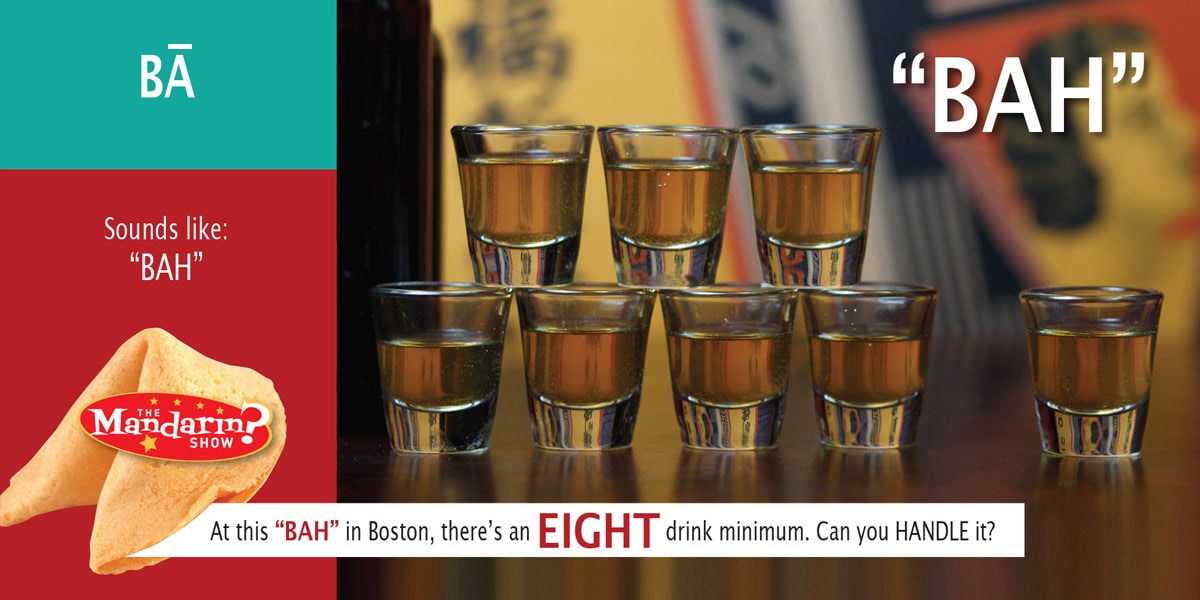If you grew up in the Boston area, you know that a “BAH” is just a place you go to have a few drinks. And a “CAH” is how you get to the “BAH.” That is, if it’s too “FAH” to walk there.
By some strange coincidence, these Boston-accented pronunciations of English words also mimic the sound of specific words from the official language of Beijing: Mandarin. In fact, there are hundreds of words in every Mandarin Chinese dictionary that incorporate these Boston-based pronunciations.
The discovery of this Boston-to-Beijing linguistic connection in 2014 by GLU (Global Learning Universe) led to many of the unique mental connections that make up “The Mandarin Show” a revolutionary new way to learn Mandarin Chinese. GLU refers to its unique methodology as “Mandarin without Memorization.TM” The show is being created and produced by GLU (Global Learning Universe) a Massachusetts-based corporation.
In the Mandarin language, the spoken sound: “BAH” can mean anything from the number “eight” to a “handle” to an alcoholic “bar.” And so, in The Mandarin Show system a verbal memory chain is created to link these multiple meanings together. This is then combined with a customized visual memory chain to reinforce both the sound and the image of the various meanings attached to this sound. In this case, it’s a picture of a bar and eight drinks stacked-up, with the caption:
At this “BAH” in Boston, there’s an EIGHT drink minimum. Can you HANDLE it?
In the “live” version of The Mandarin Show, these verbal and visual memory chains are part of staged comedy sketches, game show parodies, newscasts and similar theatrical devices typical of a late night talk show.
In fact, The Mandarin Show LIVE! has been called “a cross between Rosetta Stone and Saturday Night Live.” The show features a host, monologues, sidekicks, sight gags, a live audience and even commercial breaks in English and Mandarin.
Sounds that are familiar to Boston natives like bah(bar), cah(car), fah(far), mah(mar), pah(par), tah(tar) and yahn(yarn) can be heard throughout the Mandarin comedy sketches and language lessons in The Mandarin Show system.
The premise of the “Mandarin without Memorization” system is that learners of Mandarin do not have to actually leave their native language of English in order to acquire a new Mandarin word. The reason: the sound of each new Mandarin word in this system always approximates an English word as well. To help bridge the tonal and pronunciation gaps between an English word and its Mandarin equivalent, the system is required to make liberal use of multiple English language accents, including Jamaican, Brooklyn, British and, of course, a Boston accent.
In the GLU language learning system, instead of rote memorization, you simply jump from one English concept to another. For example, the English concept of “bar” (pronounced “bah” in both Bostonese and in Mandarin) leads to the Mandarin concept of “eight” because that’s how many drinks are served at the “bah.” The entertainment format of the Mandarin Show identifies and amplifies the mental connections between the two ENGLISH words, as the path of least resistance to learning its Mandarin meaning.
And it works. Research indicates that people using the GLU system can learn new Mandarin words at four times the rate of conventional memorization methodologies. Even years later, if they haven’t had a chance to use the new language, they still remember the connections between the words.


